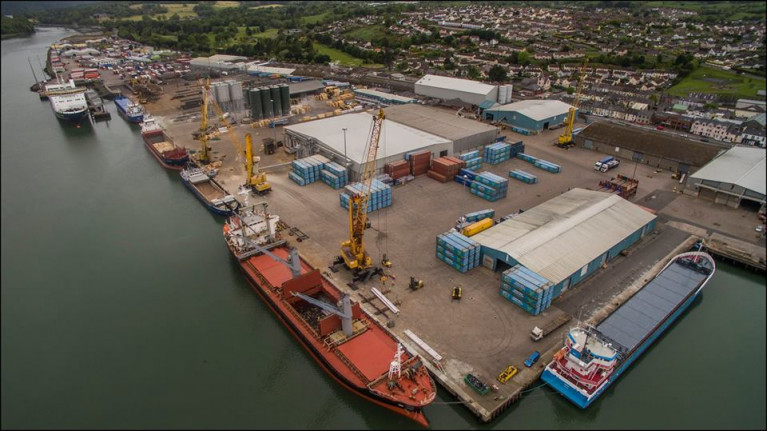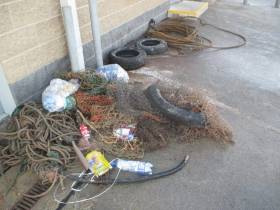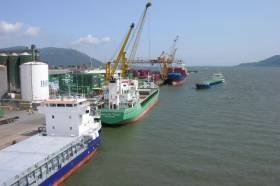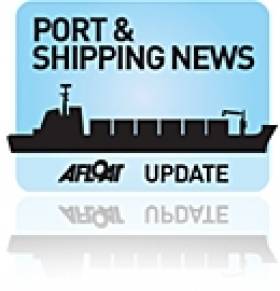Displaying items by tag: Warrenpoint Harbour
Another Sighting of Dredger ‘Charnock’ as Warrenpoint Port Maintenance Works Continue
Afloat reader Lee Maginnis has shared a new image of the suction dredger Charnock returning to Warrenpoint in Co Down after emptying its load in the open sea on Sunday (24 March).
As previously reported on Afloat.ie, the vessel has been carrying out dregding operations in the approaches and deep-water berths of the inner harbour of Warrenpoint Port since the end of February.
These operations are expected to continue until mid April.
Annual maintenance dredging at Warrenpoint Harbour in County Down will continue until the end of March and possibly into April.
According to Afloat reader Lee Maginnis, residents and visitors to Warrenpoint and, indeed, Omeath have been treated to the sight of the trailing suction dredger "Charlock" hard at work over recent weeks.
The dredging, say the harbour authorities, will 'secure the safety and accessibility of the shipping channel for commercial and recreational purposes'.
Since the end of February Charlock has been carrying out operations in the approaches and deep-water berths of the inner harbour of Warrenpoint Port, an operation that will take approximately 48 days.
The sleek, grey ship, with a bulbous bow transports dredged material to the WARRENPOINT B licenced sea disposal site outside the lough.
The Charlock is supported by the "Forth Trojan" workboat vessel, which will undertake bed levelling operations.
DfI Announce Appointments to Board of Warrenpoint Harbour Authority
Northern Ireland's Department of Infrastructure (DfI) has announced two appointments to the board of Warrenpoint Harbour Authority.
The DfI's Permanent Secretary has appointed David Gray who is to serve for a first term and Geraldine Donaghy to serve a second term on the WHA Board.
The Board members have responsibility, under a series of Harbour Orders, for preserving, improving and managing the Port of Warrenpoint.
The appointments according to the Newry Times, will take effect from 1 December 2019 and will be for a maximum of four years.
DfI has thanked the outgoing non-executive members Alan Stephens and Trevor Haslett for their valuable contribution to WHA during their tenure.
Fishing for Litter Scheme Extends Across North's Fishing Ports
#FishingForLitter - Fishing is one of the most tried and tested industries people have ever invented as we have been fishing for thousands of years. The way fish are caught has been transformed many times, but the core ideas remain. We hope the industry will be here for thousands of years to come and that’s why Northern Ireland Fishery Harbour Authority (NIFHA) in conjunction with Department of Agriculture, Environment and Rural Affairs (DAERA) and KIMO have developed Fishing for Litter (see facebook)
Years ago, the conventional wisdom was that the oceans were so vast any pollution would be diluted into safe measures. We now know this is wrong. Smaller sea creatures feed on waste, which in turn makes its way up the food chain to us. That’s bad for us to eat, and also poses a problem for the fishing industry
In recent decades, the problem has exploded because of the extensive use of petrochemical products such as plastic and oil based [paints which don’t occur naturally. Nature has no way to deal with these, so they remain in the sea causing damage to the habitats and wildlife that live there
How it Works
Boats catch litter in their nets and so each boat is supplied with a durable reusable waste bag, to store this litter until they return to the Harbour. On return to port, the skipper contacts the operational Manager to arrange collection.
The fishermen land the bag of litter, where a member of the operations team will collect it.
The operational team collect this litter using the forklift and bring it to the waste compound for sorting. Waste is recycled where possible and the rest is disposed of responsibly using local specialists.
The Net Result
For coastal towns like Warrenpoint, Kilkeel, Ardglass and Portavogie cleaner seas can have a great impact on the quality of Life By removing waste from the water around us, sea life will be able to thrive. Our Beaches will be much nicer to use, because they’ll be cleaner and safer. For fishermen, there will be less damage to the nets and less catch lost to contamination.
About the Scheme
Fishing for Litter is a project funded by DAERA which is being extended across Northern Ireland Fishing ports. The Scheme, which initially launched in Ardglass and extended to Kilkeel and Portavogie will now be introduced to Warrenpoint Harbour.
Quinn Cement to Upgrade Export Base at Warrenpoint Harbour
#Cement - Five new cement silos for Quinn Cement reports The Irish News are to be built at Warrenpoint Harbour in a £2.5 million investment.
The silos will have total storage capacity of 7,500 tonnes and will be dedicated to the export of Quinn's products.
The Fermanagh-based company has signed a 10-year deal with the harbour which construction work expected to be complete by September.
Quinn Cement said it was one half of a strategy aimed at increasing its presence in the British cement and construction markets.
For more on the story click here.
Warrenpoint Harbour Chief Call fors Funding for Relief Road
#WarrenpointHarbour – The Belfast Telegraph writes that the boss of Warrenpoint Harbour, Peter Conway has called for the construction of a relief road between the A1 and the Warrenpoint dual carriageway.
Currently all traffic going to and from the port wishing to get to the A1 has to travel through the already busy city centre of Newry.
The Harbour chief executive was speaking as it hosted the British Port Association's (BPA) annual conference, which attracted delegates from all over the UK and Ireland. Mr Conway has been lobbying for the construction of the road for many years.
He said that it would be of "fantastic benefit to the port" and would tackle their biggest problem of traffic bottle-necking in Newry. The Newry Southern Relief Road would be a one-mile link between the A2 Warrenpoint dual-carriageway and the A1 between Belfast and Dublin.
For more on this story, click HERE.

































































